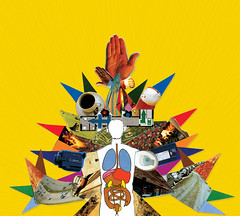
Shooting Spires
Shooting Spires
[Cardboard; 2007]
Rating: 7.8

B.J. Warshaw, aka Shooting Spires, played bass and sang in the Brooklyn experimental outfit band Parts & Labor. His one-man-band debut album, a surprisingly epic production that sounds like the work of several people despite its bedroom origins, has gorgeous washes of electric guitar along with countless space-defining and space-erasing effects. With the rusty rasp of TV on the Radio's Tunde Adebimpe (SS has toured with the band), Warshaw narrates some indecipherable but still memorable high-altitude night cruises. This is Boris rendered indie for the attention deficient-- a storyboarded version of drone that occasionally asks us to dance, shimmy, or merely nod. But there's no shoegazing or drug-taking required; it's too down-to-earth for that.
"Sky for a Sea" stands apart as the most emotionally powerful track. With the lyrics obscured by tinny reverbs and white-noise guitar, it's difficult to decipher Warshaw's sentiments-- only sad and bittersweet musical elements can clue us in to the mood. Interest in David Bowie and Brian Wilson is obvious on tracks like "Right", the opener, which stomps and whines its rant around pulsating drums and anthemic saxophones. Warshaw subjects his voice to a similar bullhorn-like processing on much of the album; it's a regrettable choice, because it fosters monotony from track to track. By the third song, boredom has set in-- but only temporarily. It's as if "Embers" and "Quarantine" are just "Right" manipulated into a faster tempo, sax replaced by flute-like synth.
Things get pretty around "Alive and Well", where the rhythm section flits around a more robust but still murky atmosphere of organs, pulsating vocals, and actual drums-- way back there around the 10th layer of track. Many of these songs have a playful and uplifting quality, but with the elephantine emphasis on rhythm and bass, nothing's ever given the chance to get flaccid or cloying. "A Million Drops" imparts a recorder-like voice that, as many of the soft melody-makers on the album do, repeats a simple melody line with a little jumpy variation.
After the golden "Sky for a Sea", there is a three-track closeout of indulgent, whining guitar sustains. There's no hope understanding the words, and Warshaw might actually need to work on this, unless he's content for the message to be yet another sublimated voice in the rhythm section. Yes, all the edgelessness can get repetitive. Warshaw, like the most capable chefs, has his favorite ingredients, but he also has his favorite tempo ranges and chord progressions. Still, more often than not, the results are addictive; Warshaw's signature is almost identical from track to track, but it's as otherworldly and strange as it is friendly and human.
-Liz Colville, November 15, 2007
www.myspace.com/shootingspires
